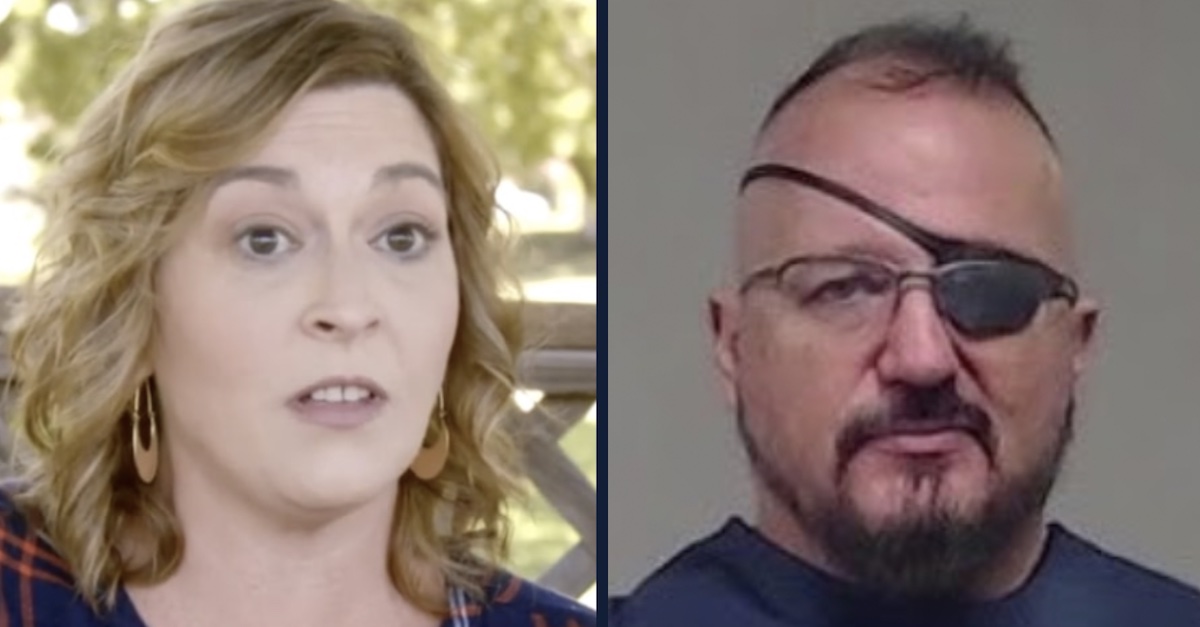
Kellye SoRelle, Stewart Rhodes
The leader of the Oath Keepers and his lawyer, now both indicted on charges related to the Jan. 6th attack, exchanged sexually charged text messages days before the breach of the U.S. Capitol.
“Speaking of fucking… if you need some, come on over,” Oath Keepers leader Stewart Rhodes wrote to his lawyer Kellye SoRelle on Jan. 3, 2021, when both were staying at a Hilton Garden Inn.
The salacious message was entered into evidence during the trial of Rhodes, who faces charges of seditious conspiracy, obstruction of an official proceeding, and other charges related to the attempt to block the congressional certification of President Joe Biden’s victory. SoRelle is facing a separate prosecution on four charges, which do not include seditious conspiracy.
In denying SoRelle’s bail, a federal magistrate cited a romantic relationship between her and Rhodes, and SoRelle denied that they had one.
The text message exchange showed another story.
After SoRelle initially said that she couldn’t join the Oath Keepers leader in his room, Rhodes replied that he would “drag” her into his room and throw her onto the bed.
“That’s how I know you’re trouble,” SoRelle told Rhodes. “You’re too good at what you do. Whole bad boy thing. I am a damn moth to a [flame emoji].”
It was not immediately clear what prosecutors intended to show with the admission of the evidence. Rhodes’s attorney did not lodge any objection before the text messages were introduced, but the legal team did try, unsuccessfully, to suppress messages between Rhodes and SoRelle generally, calling the exchanges “personal” and not privileged.
Former federal prosecutor Mitchell Epner, now a partner with Rottenberg Lipman Rich PC, expressed surprise at their admission.
“Although sexual relationships between attorneys and clients are strongly discouraged, they do not automatically obviate attorney-client privilege,” Epner told Law& Crime. “The messages (which are highly salacious) clearly are not privileged themselves, as they were not sent for purposes of obtaining legal advice.”
“Ordinarily, these types of personal messages would be excluded from evidence under Federal Rule of Evidence 403, because their probative value is highly outweighed by the possibility of unfair prejudice,” Epner said. “I do not know whether Rhodes’ attorney made a Rule 403 objection. If not, that is a shockingly bad decision.”
The messages came into evidence during the ongoing testimony of FBI agent Sylvia Hilgeman, a 13-year veteran at the bureau who authenticated them.
Earlier on Monday morning, Hilgeman showed jurors a broad array of closed-circuit TV surveillance footage from the Comfort Inn in Ballston, Va., the meeting point of the Oath Keepers’ so-called quick reaction force. Also known as a QRF, the group of Oath Keepers stashed firearms inside the hotel in case then-President Donald Trump called them to ferry those weapons over the Potomac into Washington, D.C., prosecutors say.
Footage played in court showed Arizona-based Oath Keepers member Edward Vallejo pushing dolly carts with several totes around the hotel. Two members of the Oath Keepers from Ohio — Jessica Watkins and Donovan Crawl — were seen entering the hotel, as identified by the agent on the footage.
So were Thomas Caldwell and his wife, Sharon Caldwell. Only the husband has been accused of any crime, and his defense attorney David William Fischer, Sr. has tried to depict him as an elderly bystander who’s too infirm to try to over through the government.
The government sought to undermine that defense with footage of Caldwell walking in the hallways.
Asked by a prosecutor what Caldwell was using to assist himself while walking, Hilgeman replied: “Nothing.”
Shortly before the lunch recess, Fischer began questioning the FBI agent.
Read the direct messages here.